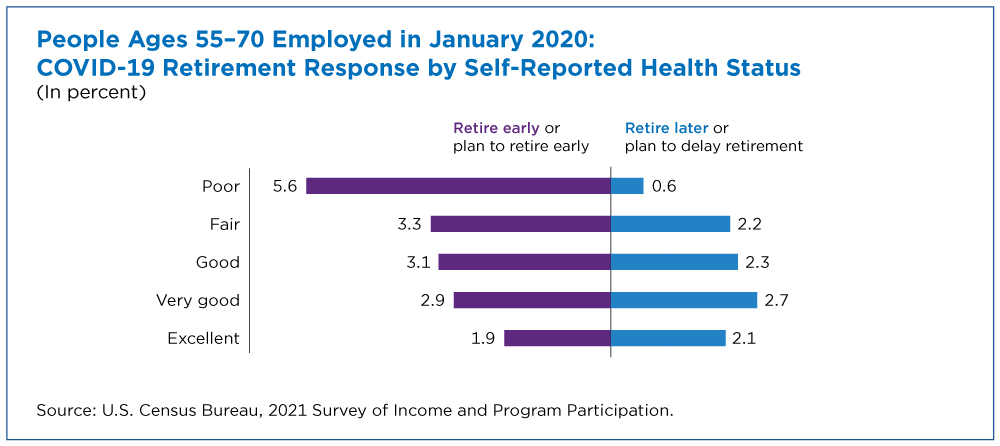Pandemic Disrupted Labor Markets but Had Modest Impact on Retirement Timing
The COVID-19 pandemic’s disruption of labor markets was massive, but it had only a modest impact on peoples’ retirement timing, according to recently released data from the U.S. Census Bureau’s 2021 Survey of Income and Program Participation (SIPP).
The SIPP collected data on respondents’ labor force status in 2020, the first year of the pandemic. These data show modest pandemic-related effects on retirement. The share of respondents ages 55-70 who said they were retired dipped slightly from January to December that year.
When asked how the pandemic affected the timing of their retirement, 2.9% of adults ages 55-70 employed in January 2020 said they retired early or planned to retire early due to the pandemic, while 2.3% said they either delayed or planned to delay retirement for the same reason.
Those reporting poor health skewed toward early retirement: 5.6% reported that they had retired early or planned to retire early due to COVID-19 and 0.6% reported that they had delayed or planned to delay retirement.
Retirement trends were remarkably stable during a period of upheaval in the labor market overall.
Because of workplace shutdowns and demand shifts during the pandemic, unemployment increased from 3.5% in February 2020 to a peak of 14.7% in April 2020. Given the pandemic’s differential health effects by age, many speculated that the pandemic would also lead to mass retirement.
Retirement Patterns
The 2021 SIPP asked respondents about their employment and labor force participation during the previous calendar year — 2020. In contrast to other household surveys (which either collect annual data or whose sample composition varies throughout the year), SIPP collects monthly information about the same sample for the entire year.
The share of respondents ages 55-70 who reported retirement as their reason for not holding a job fell modestly from 29.4% in January to 28.2% by December.
There was no discernible change from January through the first several months of the pandemic.
Age, Health, Retirement
After the pandemic began, the Census Bureau added new questions to the 2021 SIPP that asked respondents how the pandemic affected them.
One question asked respondents ages 55 and older specifically how the coronavirus pandemic affected their retirement timing, or for those respondents who had not yet retired, their expected retirement timing. According to these reports, the changes were modest.
Among those employed in January 2020, the impact differed by age. Adults 62-65 years old reported the most changes, with 4.6% saying they had retired early or planned to retire early and 2.9% saying they had delayed or planned to delay their retirement.
SIPP asked respondents to rate their health on a five-point scale: excellent, very good, good, fair and poor. Changes to retirement timing in response to COVID-19 varied by the health rating respondents reported.
Those reporting poor health skewed toward early retirement: 5.6% reported that they had retired early or planned to retire early due to COVID-19 and 0.6% reported that they had delayed or planned to delay retirement.
Retirement timing differences for other values of self-reported health were not statistically significant.
Retirement Timing by Industry
The pandemic had a major impact on jobs that require face-to-face interaction or cannot be performed remotely. It also contributed to considerable supply and demand shifts that affected employment patterns.
Did COVID-19’s impact on retirement timing affect people in some industries more than others? Again, changes were modest.
Given the relatively small age group examined and the fact that some industries employ relatively few older people, it was necessary to collapse industry categories to a greater extent in this than in many other Census Bureau data products. Respondents can report multiple jobs in SIPP; the figure uses the first reported job for January 2020.
Among the findings:
- Workers in education jobs more often retired or planned to retire earlier (4.3%) rather than delayed or planned to delay retirement (2.1%).
- Workers in hospitality and other services were also more likely to move up than delay their retirement: 3.6% reported they had retired early or planned to retire early, while 1.7% reported they had delayed or planned to delay retirement.
Differences between early and delayed retirement were not statistically significant for other industry groups.
Earnings and Retirement Timing
Retirement responses to the COVID-19 pandemic varied somewhat by earnings, based on monthly earnings from wages, salary, tips and self-employment in January 2020. SIPP respondents who earned the least were more likely to say that they moved up their retirement or planned retirement than that they delayed retirement.
Among the first quintile (the lowest earners), 3.4% said they planned to retire early compared to 1.8% who said they would delay retiring. In the second quintile, the difference was 3.7% and 0.9%, respectively.
Differences among higher earners (the third, fourth and fifth quintile) were not statistically significant.
About SIPP and its COVID content
The COVID-19 retirement questions were added late in the development of the 2021 SIPP survey and therefore did not undergo as rigorous development and testing as other SIPP content. However, question nonresponse rates and field notes from interviewers suggest less than half a percent of unweighted respondents were confused by the questions or did not know how to respond.
Other Census Bureau research has documented that survey response rates and other aspects of data collection were affected by the COVID-19 pandemic. However, the pandemic's effects appear to have been strongest during surveys conducted in spring 2020. The 2021 SIPP was conducted in spring 2021 and asked respondents about their experiences during the previous calendar year.
The Survey of Income and Program Participation is a nationally representative, longitudinal survey administered by the Census Bureau that provides comprehensive information on the dynamics of income, employment, household composition and government program participation.
The SIPP webpage and the SIPP Technical Documentation webpage provide more information about SIPP data quality and technical documentation. The estimates presented here are subject to sampling and nonsampling error.
Related Statistics
-
Stats for StoriesOlder Americans Month: May 2023The 2021 American Community Survey estimated there were 55,892,014 people aged 65 and over in the U.S. out of a total population of 331,893,745, or 16.8%.
-
Survey of Income and Program Participation (SIPP)Provides comprehensive information on the dynamics of income, employment, household composition, and government program participation.
Subscribe
Our email newsletter is sent out on the day we publish a story. Get an alert directly in your inbox to read, share and blog about our newest stories.
Contact our Public Information Office for media inquiries or interviews.
-
America Counts StoryWho Has Retirement Accounts?August 31, 2022The Survey of Income and Program Participation shows how many people are saving for retirement.
-
America Counts StoryWomen More Likely Than Men to Have No Retirement SavingsJanuary 13, 2022Are your retirement savings related to the number of times you have been married or the number of partners with whom you have children?
-
America Counts StoryWhat Happens When Older Adults Struggle to Make Ends Meet?October 28, 2021The packages of needs-based assistance that some older adults rely on may indicate difficulty affording health care, food, shelter and other necessities.
-
EmploymentThe Stories Behind Census Numbers in 2025December 22, 2025A year-end review of America Counts stories on everything from families and housing to business and income.
-
Families and Living ArrangementsMore First-Time Moms Live With an Unmarried PartnerDecember 16, 2025About a quarter of all first-time mothers were cohabiting at the time of childbirth in the early 2020s. College-educated moms were more likely to be married.
-
Business and EconomyState Governments Parlay Sports Betting Into Tax WindfallDecember 10, 2025Total state-level sports betting tax revenues has increased 382% since the third quarter of 2021, when data collection began.
-
EmploymentU.S. Workforce is Aging, Especially in Some FirmsDecember 02, 2025Firms in sectors like utilities and manufacturing and states like Maine are more likely to have a high share of workers over age 55.








